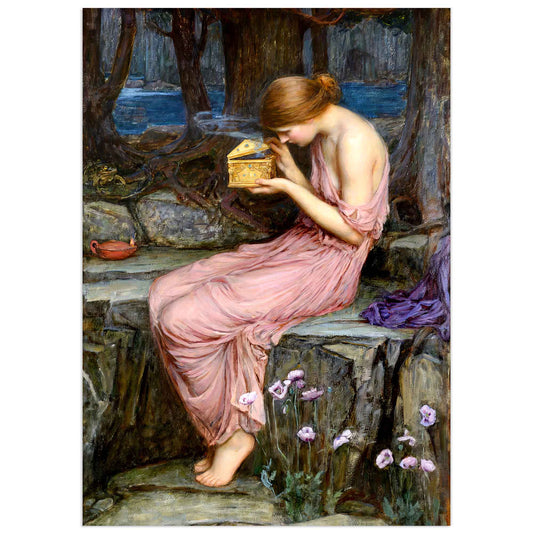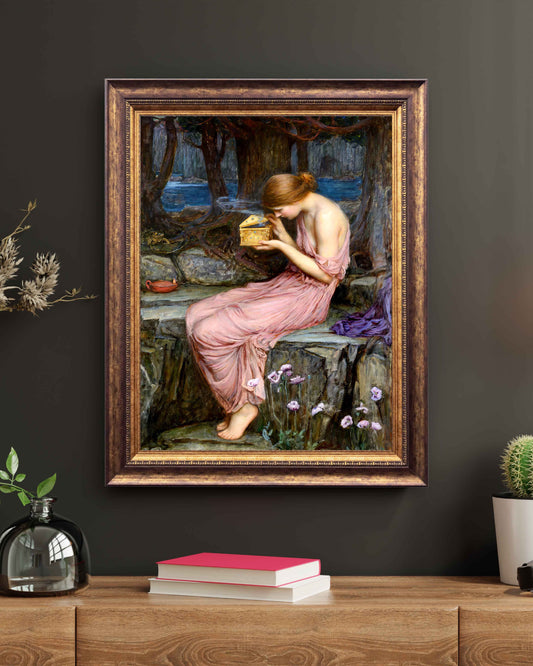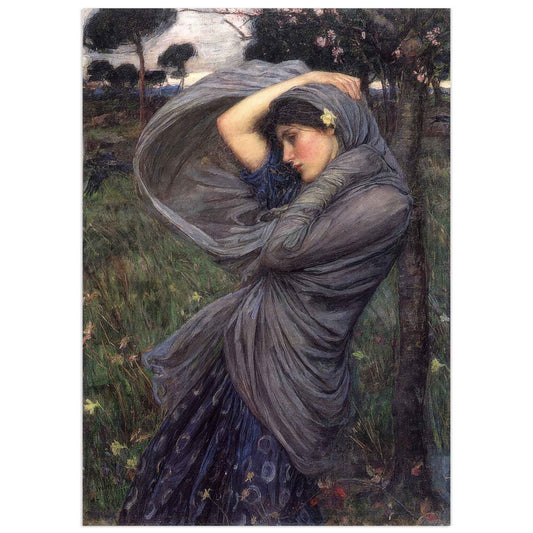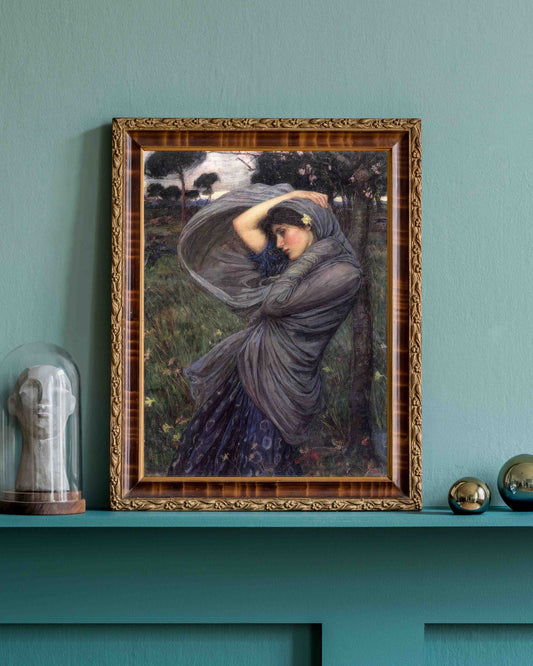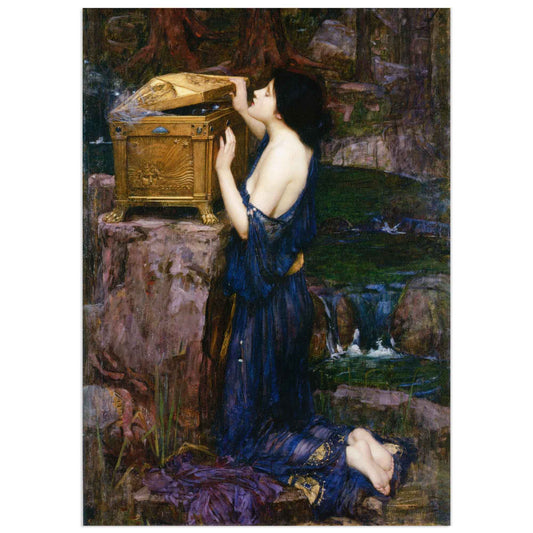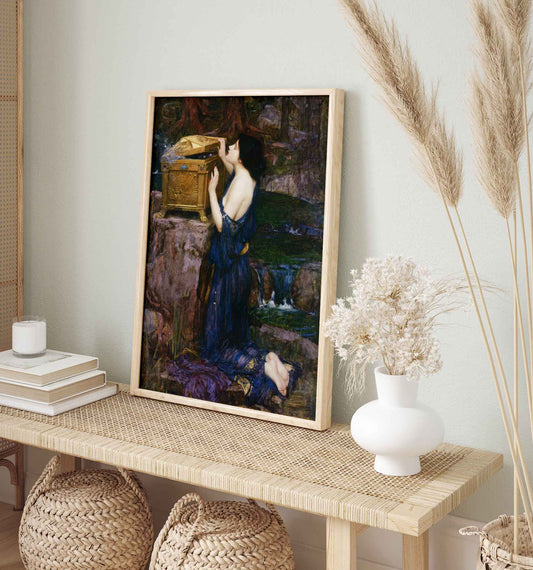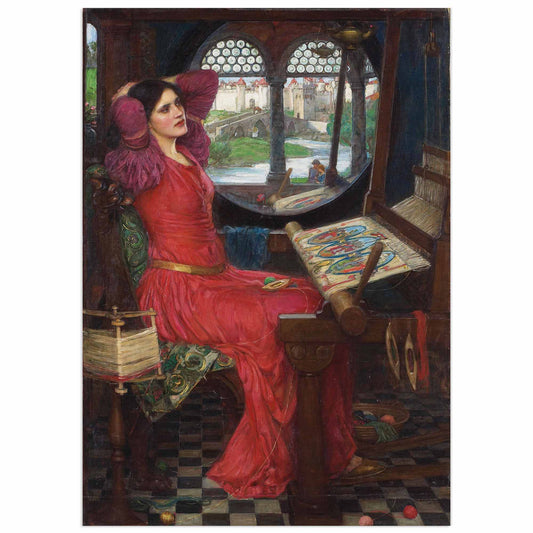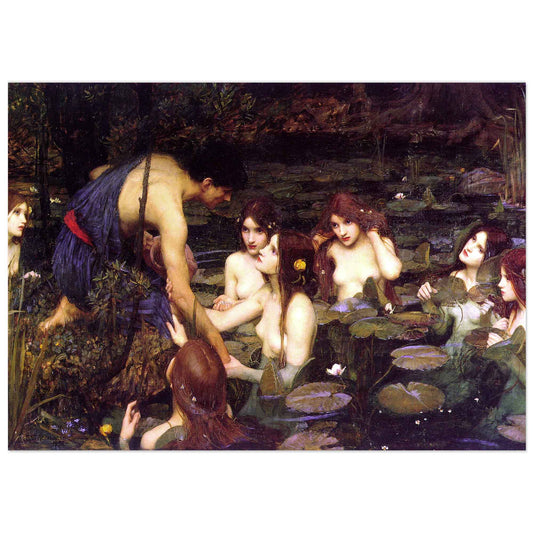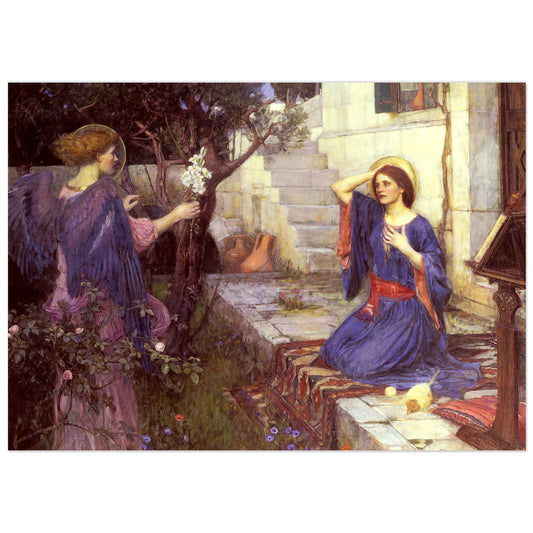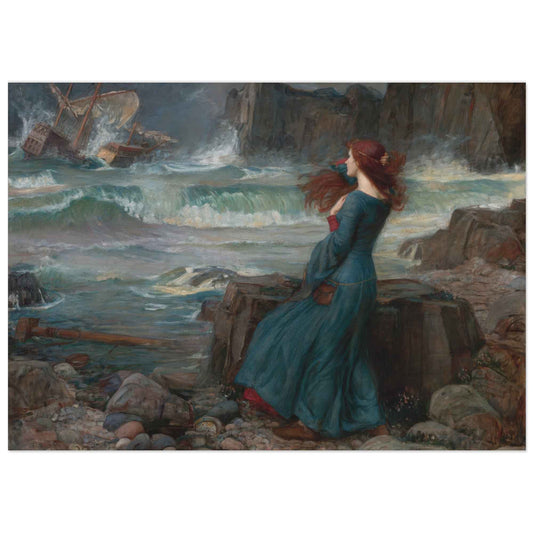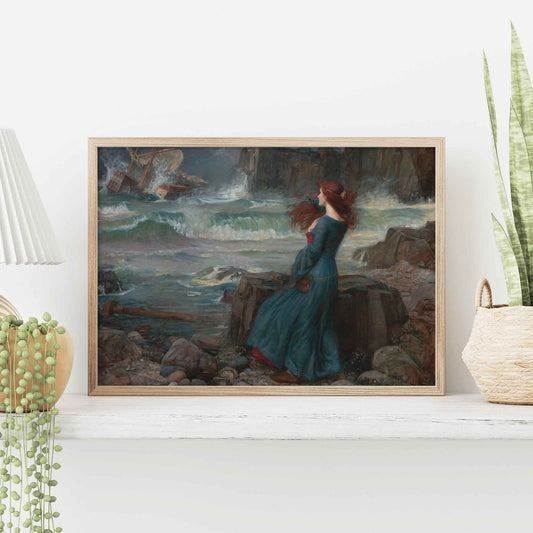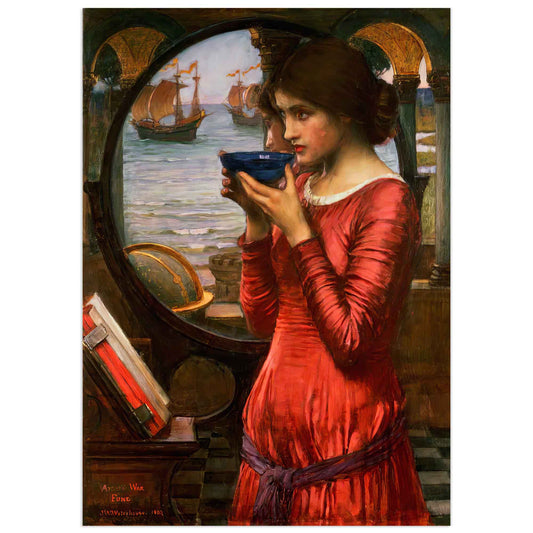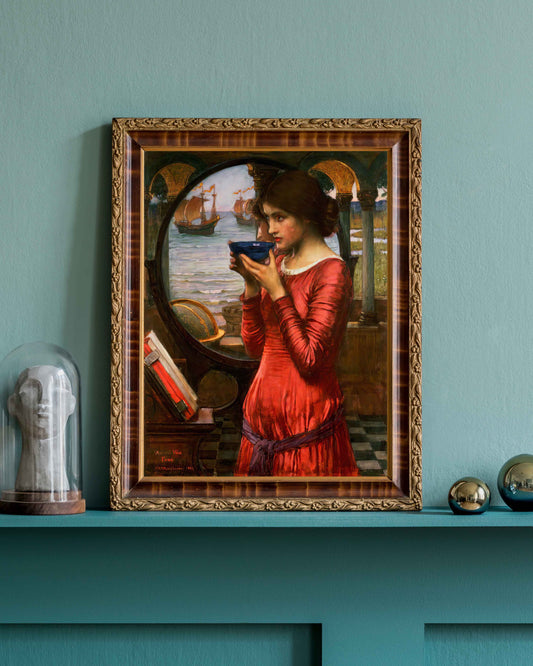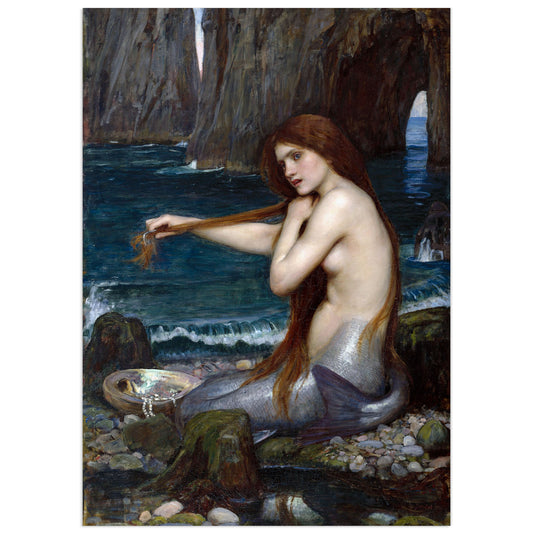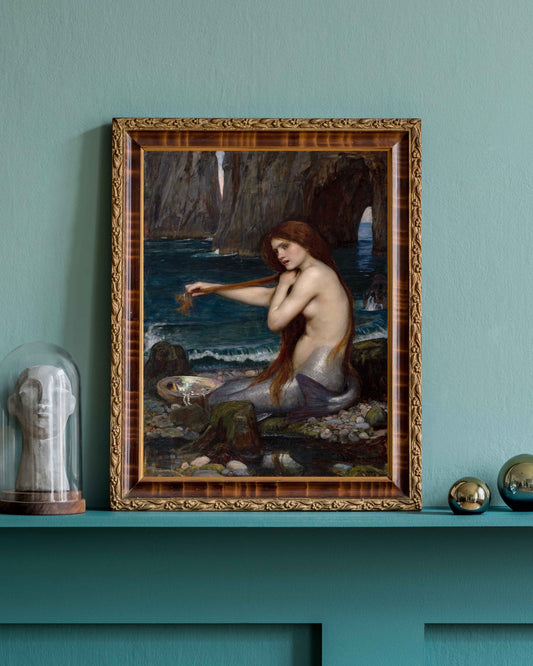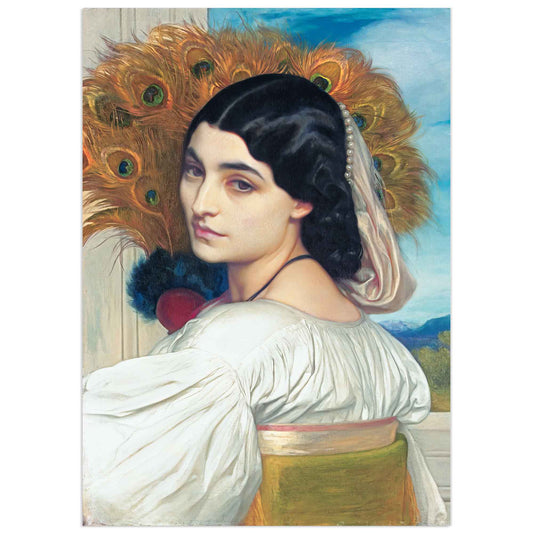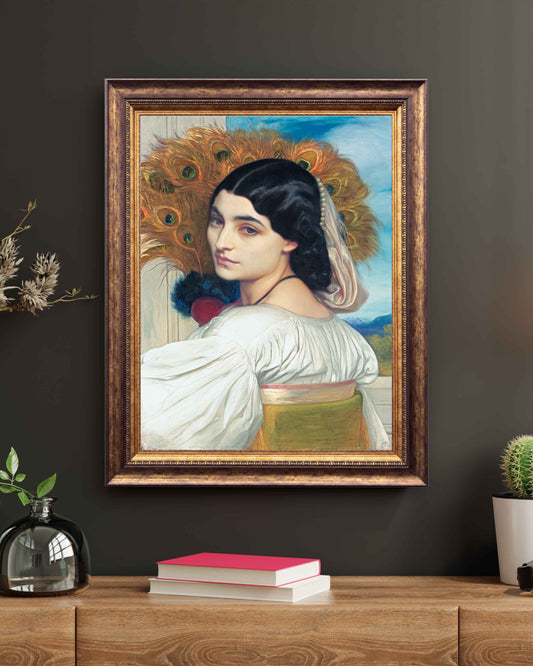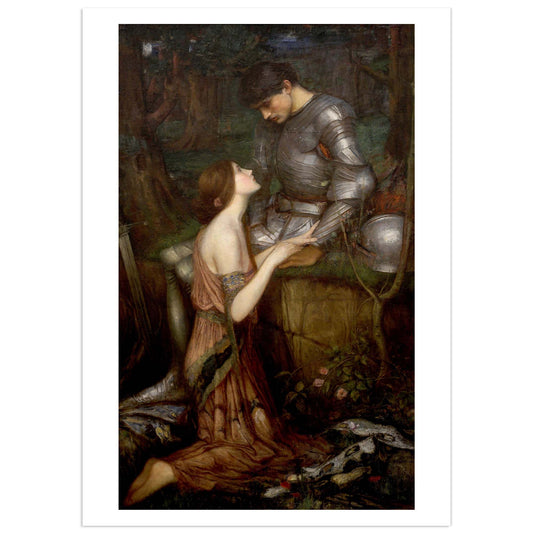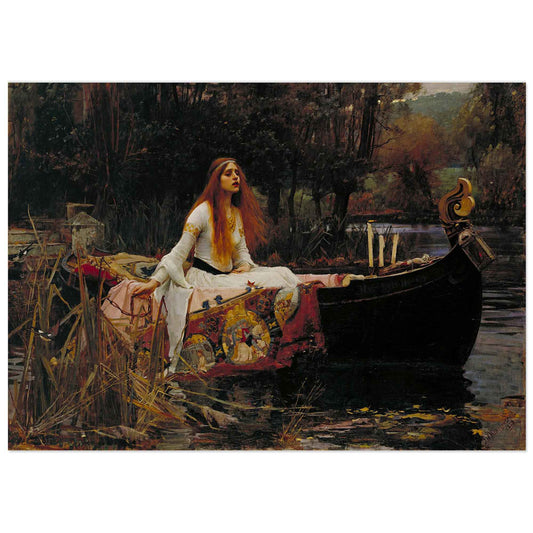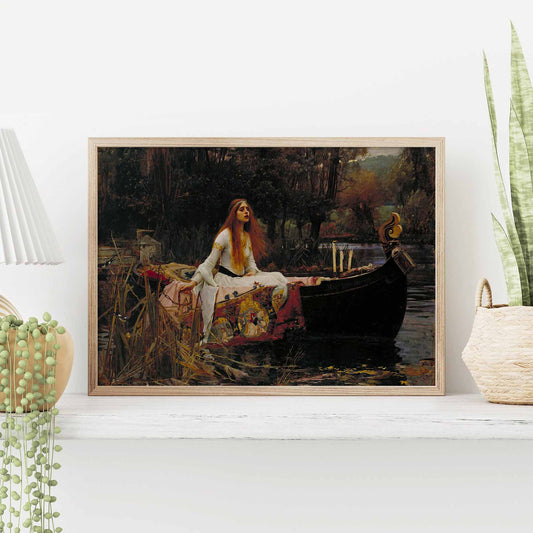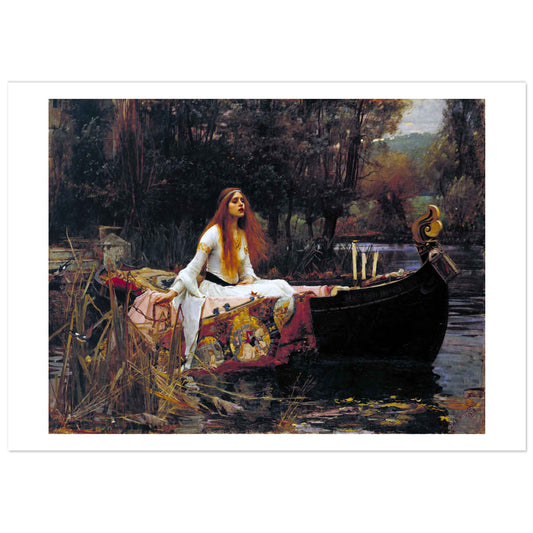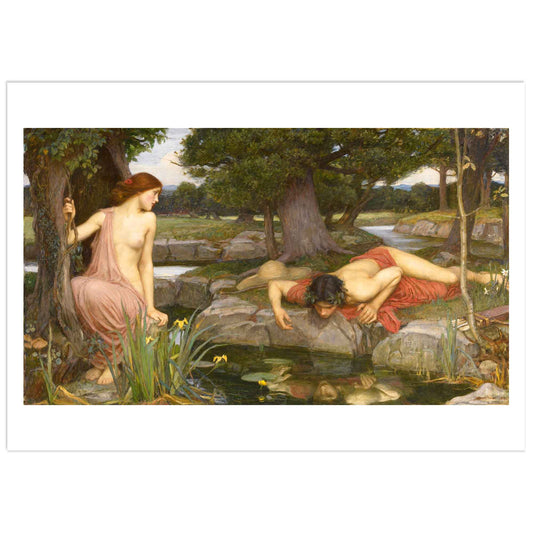Collection: John William Waterhouse Prints
Step into the enchanting world of John William Waterhouse, a masterful English painter celebrated for his poetic storytelling and mythological scenes. Born in Rome in 1849, Waterhouse grew up surrounded by classical influences, and his fascination with Greek mythology and Arthurian legends permeates his work. Having entered the Royal Academy of Art at a young age, he developed a style influenced by contemporaries like Alma Tadema and Frederic Leighton, blending academic rigor with the romantic, dreamlike qualities that define his oeuvre.
Our curated collection of fine art prints captures the ethereal beauty, literary references, and romantic spirit of Waterhouse’s most iconic works. From The Lady of Shalott and Hylas and the Nymphs to Ophelia, each reproduction is printed with exceptional attention to detail and color, remaining faithful to the artist’s vision. Perfect for collectors, interior designers, or lovers of timeless art, these prints bring a touch of 19th-century magic into your home. Browse the collection below and discover the world of Waterhouse.
-
Psyche Opening The Golden Box , John William Waterhouse
Vendor:Wallango5.0 / 5.0
(1) 1 total reviews
Regular price From $32.44 USDRegular priceUnit price / per -
Boreas, John William Waterhouse
Vendor:Wallango5.0 / 5.0
(2) 2 total reviews
Regular price From $32.44 USDRegular priceUnit price / per -
Pandora by John William Waterhouse – Pre-Raphaelite Art Reproduction
Vendor:Wallango5.0 / 5.0
(1) 1 total reviews
Regular price From $32.44 USDRegular priceUnit price / per -
Lady of Shalott Poster by John William Waterhouse
Vendor:WallangoRegular price From $32.44 USDRegular priceUnit price / per -
Hylas and the Nymphs, John William Waterhouse
Vendor:WallangoRegular price From $32.44 USDRegular priceUnit price / per -
The Annunciation, John William Waterhouse
Vendor:WallangoRegular price From $32.44 USDRegular priceUnit price / per -
Miranda – The Tempest by John William Waterhouse – Fine Art Reproduction Print
Vendor:WallangoRegular price From $32.44 USDRegular priceUnit price / per -
Destiny, John William Waterhouse
Vendor:WallangoRegular price From $32.44 USDRegular priceUnit price / per -
The mermaid, John William Waterhouse (1900)
Vendor:Wallango5.0 / 5.0
(1) 1 total reviews
Regular price From $32.44 USDRegular priceUnit price / per -
Pavonia , Frederic Leighton
Vendor:WallangoRegular price From $32.44 USDRegular priceUnit price / per -
Lamia, John William Waterhouse
Vendor:WallangoRegular price From $32.44 USDRegular priceUnit price / per -
The Lady of Shalott – Art Print after John William Waterhouse (1888)
Vendor:WallangoRegular price From $32.44 USDRegular priceUnit price / per -
The Lady of Shalott, John William Waterhouse
Vendor:WallangoRegular price From $32.44 USDRegular priceUnit price / per -
Echo and Narcissus, John William Waterhouse
Vendor:Wallango5.0 / 5.0
(1) 1 total reviews
Regular price From $32.44 USDRegular priceUnit price / per
About John William Waterhouse and His Iconic Paintings
John William Waterhouse (1849–1917) is celebrated as one of the last great figures of the Pre-Raphaelite and Romantic traditions. His paintings, filled with mythological and literary references, are renowned for their dreamlike atmosphere and exquisite treatment of the female form. Having exhibited at the Royal Society of British Artists and other major galleries, Waterhouse earned recognition for his ability to blend narrative, sensuality, and symbolism. His work often explores themes of sleep and his half-brother’s death, lending an emotional depth that resonates across generations.
Our fine art prints include faithful reproductions of his most beloved masterpieces, from The Soul of the Rose to Pandora. Each piece evokes a world of ancient myths, Shakespearean heroines, and Arthurian legends. Produced using archival inks and premium paper, these prints ensure color fidelity and lasting beauty, making them ideal for art collectors or as a thoughtful gift.
Waterhouse’s visual language—fluid lines, luminous skin tones, and richly textured fabrics—has captivated audiences well into the 20th century. William Waterhouse was born with a talent that merged classical training with a romantic imagination, leaving a legacy now housed in museums worldwide and commemorated at Kensal Green Cemetery in London.
Whether you’re decorating a refined interior, building a collection of mythological art, or seeking a timeless piece inspired by Greek myths, Arthurian legends, and Victorian romanticism, our Waterhouse prints offer a window into the enchanting and evocative world of this legendary painter.
FAQ – John William Waterhouse Art Prints
1. What was John William Waterhouse famous for?
John William Waterhouse (1849–1917) was an English painter renowned for his romantic and mythological paintings, often depicting strong, enigmatic women drawn from literature and Greek mythology and Arthurian legends. His distinctive style bridges the Pre-Raphaelite movement, classical academic painting, and the dreamlike qualities of Victorian art.
2. What style of art is Waterhouse?
Waterhouse’s art is closely associated with the Pre-Raphaelite Brotherhood, although he painted several decades after its founding. He blended romanticism, symbolism, and academic realism with literary and mythological themes, creating compositions full of narrative, emotional depth, and ethereal beauty. Influences include Alma Tadema, Frederic Leighton, and classical training after he entered the Royal Academy of Art.
3. Was John William Waterhouse a romantic painter?
Yes, many of Waterhouse’s works express romantic themes, both in emotional tone and subject matter. He frequently illustrated tragic love stories, mythological romances, and literary heroines like Ophelia and The Lady of Shalott. His paintings often explore themes such as sleep and his half-brother’s death, adding personal depth to his artistic expression.
4. Where did Waterhouse exhibit his paintings?
Waterhouse exhibited at the Royal Society of British Artists and at various galleries throughout the 19th century, earning recognition for his technical skill and imaginative compositions. His works were also admired by his contemporaries and collectors of Victorian art.
5. Where can I find John William Waterhouse paintings?
Original paintings are held in museums such as Tate Britain, the Art Gallery of South Australia, and private collections. High-quality art prints of Waterhouse’s masterpieces are available in our curated collection.
6. What is the meaning of “The Soul of the Rose” painting?
The Soul of the Rose is inspired by Alfred Lord Tennyson’s poetry and broader literary and mythological references. It evokes themes of longing, memory, and sensuality. The woman smelling the rose represents a deep emotional connection with nature, beauty, and nostalgia.
7. Who is the woman smelling a rose in Waterhouse's painting?
She is a symbolic figure, not a specific character, embodying idealized beauty, introspection, and the Pre-Raphaelite fascination with emotional storytelling.
8. What do roses represent in paintings?
In art, roses symbolize love, beauty, purity, and the passage of time. In Pre-Raphaelite works, they often convey romantic longing, emotional depth, or spiritual reflection.
9. What is the meaning of the painting “Boreas”?
Boreas depicts a young woman caught in a gust of wind, referencing the Greek god of the North Wind. It captures vulnerability, the power of nature, and an almost spiritual stillness within movement, drawing from Greek mythology.
10. What does Boreas symbolize?
In Greek mythology, Boreas represents the unpredictable and awe-inspiring forces of nature. In Waterhouse’s painting, it evokes emotional turbulence, the sublime, and the beauty of chaos.
11. Is Boreas a good or bad figure?
Boreas is neither entirely good nor bad. Like many mythological figures, he represents natural forces beyond human control. Waterhouse emphasizes the beauty within that chaos.
12. Who influenced Waterhouse?
Waterhouse was influenced by classical and academic painters, including Alma Tadema and Frederic Leighton, as well as the Pre-Raphaelite tradition. His training at the Royal Academy of Art and exposure to classical sculpture and literature shaped his unique artistic vision.
13. Where is John William Waterhouse buried?
Waterhouse was laid to rest at Kensal Green Cemetery in London, reflecting his status as a prominent figure in Victorian art.
14. Why are Waterhouse prints valuable for collectors?
High-quality reproductions of Waterhouse’s work capture his dreamlike compositions, mythological themes, and romantic storytelling. Produced with archival inks and premium paper, these prints preserve color fidelity and are ideal for collectors, interior designers, or anyone seeking a window into the Victorian imagination.

